News of the extended network of faculty, alumni, students, visiting researchers, and mission partners is regularly updated, and some of the big ideas or major events in Global Christianity are covered in the CGCM News.
Korean Diaspora Progress Reported
The team of researchers who have been working to construct the ground floor of a project to understand the establishment and growth of the Korean Diaspora community in Boston in the 1950s and 1960s presented the results of their work to date at CURA, the Institute for Culture, Religion and World Affairs on April 8.
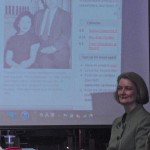
Dr. Dana Robert introduced the project and briefly described a meeting with Dr. Hesung Koh who helped inspire it and advanced a working relationship between the Center for Global Christianity and Mission and the East Rock Institute which is located in New Haven, CT and is one of the oldest and most important Korean culture institute.
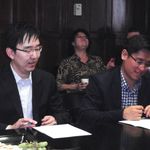 Daewon Moon talked about the Korean Society of Boston and the first Korean church of Boston, both founded in 1953 and how they contributed to promoting Korean Studies at the universities in the Boston area.
Daewon Moon talked about the Korean Society of Boston and the first Korean church of Boston, both founded in 1953 and how they contributed to promoting Korean Studies at the universities in the Boston area.
Hye Jin Lee talked about Sungha Kim, a Korean BU alum, who made huge contributions to the development of the Korean Collection at the Harvard-Yenching Library.
Dr. Doug Tzan talked about the methodological issues involved in the project. 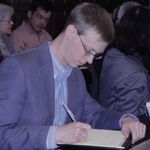
A diverse group of scholars from different parts of the BU community assembled to hear the presentation, ask questions, offer advice, and commit to helping advance the project to the next level.
East Rock Institute Newsletter
East Rock Institute is our partner in this project.
Here is the latest newsletter.
This newsletter includes an article by Hye Jin Lee about the project on page 6 but a link to the entire newsletter is included here for readers who want to get better acquainted with this organization.
Prof. Robert Presents Augsberger Lectures
Professor Dana Robert delivered the Augsberger Lecture series at Eastern Mennonite University in Harrisonville, VA on March 19 and 20, 2013. Each of the three lectures addresses an aspect of friendship as mission. The audio files are included here so you, too, can listen! Many thanks to Eastern Mennonite for these and for the photos by Jonathan Bush.
Lecture #1 - Friendship as an Incarnational Mission Practice
"Through the incarnation, God became human in the person of Jesus. And Jesus’s ministry was one based on friendship. And the purpose of friendship was to build a fellowship that witnessed to the kingdom of God."
Lecture #2 - Friendship as a Missional Practice: Lessons in History
"Cross-cultural friendship is grounded in a common relationship with Jesus Christ. It shapes shared visions of shalom. It creates community broader than our nuclear family and tribe. We become links in a chain that began with Jesus himself, and moved down through history."
Lecture #3 - Friendship in the Way of Jesus
"How should friendship and mission relate to each other? When you engage in mission projects, especially those that take you to another part of the world, or when you relate to persons unlike yourself, what do you mean by friendship?"
New article about Inus Daneel
A new article has appeared about Dr. Marthinus Daneel and Zimbabwe in The Witness. Click through to the post to get the link.
Dietrich Bonhoeffer: Culture Warrior?
I was horrified upon finishing the audio recording of Eric Metaxas’s biography of German theologian Dietrich Bonhoeffer -- Bonhoeffer: Pastor, Martyr, Prophet, Spy -- to learn that Metaxas had an agenda in writing the biography that a) never occurred to me, and b) seems entirely at odds with Bonhoeffer’s own words and deeds. Metaxas used Bonhoeffer’s life story to draw a parallel between the Third Reich’s takeover of the Lutheran church and the U.S. government’s attempts, among others, to mandate access to birth control and uphold Roe v. Wade. Metaxas believed these to be evidence of a dangerous federalism encroaching on church freedom of belief. In addition, he wanted readers to understand Bonhoeffer’s absolute rejection of Hitler as a model for American reactions to Islamic fundamentalists and the Taliban. While I appreciate the urge to enlarge the circle of those who appreciate Bonhoeffer, I find Metaxas’s move to parachute Bonhoeffer into the middle of contemporary American culture wars ahistorical and problematic. In retrospect, I can identify parts of the biography where Metaxas tipped his hand – and I wish I’d picked up on these cues earlier. Metaxas focused on Bonhoeffer’s defiance of family opinion to pursue a career as a pastor rather than as an academic. To Metaxas, this served as an early sign of Bonhoeffer’s unwillingness to join his family’s place in Germany’s liberal, cultural elite. When Bonhoeffer studied in Manhattan at Union Theological Seminary in 1930-31, he was most inspired by the vibrancy and passion of African American worship and gospel singing. To Metaxas, this was evidence of Bonhoeffer’s rejection of the liberal intellectual strains of American Christianity he encountered at Union. Metaxas further underscored this rejection when he chronicled Bonhoeffer’s return to New York and Union in 1939. Bonhoeffer chose not to worship on Sundays at The Riverside Church with the city’s liberal elite. Instead, he frequented a church where sermons were firmly rooted in scriptural analysis. To Metaxas, this was a sign of Bonhoeffer’s rejection of liberal, intellectual theology focused on issues of social justice. Reviewers far more qualified than I have explained why Metaxas should be taken to task for making these kinds of associations. In articles here, here, and here, they complained that Metaxas engaged in “terrible oversimplification” to create a political and theological “polemic.” Clifford Green, executive editor of Dietrich Bonhoeffer Works, advised readers to use metaphorical “bifocals” to keep an eye on the interviews Metaxas gave as well as the text he wrote. “Polarization,” Green wrote, “is the structural motif of the whole narrative.” All reviewers cited Metaxas for factual errors, which, they argued, allowed him to ignore what he either didn’t like or didn’t understand in Bonhoeffer’s theology. The biography, Victoria J. Barnett wrote, is “consciously evangelical” in a U.S. context. This isn’t necessarily a bad thing, explained Barnett, who is general editor of Dietrich Bonhoeffer Works and director of church relations at the U.S. Holocaust Museum. At the same time, she cautioned mixing “faith” and “ideology,” which Bonhoeffer, himself, identified as leading to trouble. Because of Metaxas’s perspective, Clifford Green wrote in his review, he hasn’t actually written a historical biography of Dietrich Bonhoeffer. Instead, Green concluded, Metaxas’s “real target is liberals.” Further fishing on the Internet led me to a study guide publishers included in the book. Though Metaxas may not have written the questions himself, he surely gave the go ahead. The questions are leading. They force readers to start their analysis of Bonhoeffer from a fundamentalist position. They range from historically presentist to outright offensiveness. “Are there efforts today to silence those who would preach the full gospel? Where? What attempts are being made to stifle Bible truth?” (603). “Where should a servant of Christ draw the line in adapting to his/her surrounding culture?” (597). My biggest objection to this line of questioning is that it encourages readers to ignore Bonhoeffer’s honest interest in the ways people of many faiths chose to uphold the ethical principles Jesus articulated in the Sermon on the Mount, whether they believed Jesus was the son of God or held the promise of eternal salvation. To Metaxas, such a position – which he denied Bonhoeffer -- leads to watered down, inauthentic Christianity. To Christians such as Barry Alter and her circle – and, indeed, to Dietrich Bonhoeffer, himself – this is the position from which lived Christianity begins. Metaxas included a passage from a letter that gets at the heart of the interpretive dilemma. In this letter from London that he sent his paternal grandmother Julie in 1934, Bonhoeffer expressed interest in traveling to India to live and study with Gandhi. It sometimes seems to me that there’s more Christianity in [India’s] ‘heathenism’ than in the whole of our Reich Church. Christianity did in fact come from the East originally, but it has become so westernised and so permeated by civilised thought that, as we can now see, it is almost lost to us. Though he had a letter of introduction to Gandhi, and though Gandhi extended an invitation to him, Bonhoeffer never made the trip. I suspect that Metaxas focused on the word “thought,” questioning the role of ideas and intellectual inquiry in faith. Bonhoeffer’s words indicate something entirely different. He was setting east and west in opposition, perhaps romanticizing India in the ways that cultural and political critic Edward Said would have called “orientalism.” But Bonhoeffer wasn’t putting down India. He wasn’t calling Hindus heathens – that’s why he put the word in quotes. Bonhoeffer was genuinely interested in exploring the ways people of faith around the world managed to live principled lives. To Metaxas, that kind of approach smacks of wishy-washy cultural relativism. To me, this shows that Bonhoeffer wasn’t coming at Christian evangelicalism in the trope of “the west to the rest.” Indeed, it’s these qualities of curiosity and openness that have drawn me to my project, In the Midst. My conversations with Barry Alter and those of her cohort who survive have helped me gain a clearer understanding of the many ways people of great moral and ethical character have strengthened their commitments to their own faiths and also celebrated different ways of experiencing the Divine. Barry, for instance, studied with the French Catholic mystic Abishiktananda. She meditates and contemplates during her daily devotions. Her mantra is “dwell,” which she tells me helps bring her closer to the Holy Spirit. When Barry finishes her meditations, she sings hymns from a book her father, a Congregationalist minister, gave her when she was a child in 1930. Most of those hymns date back to the nineteenth century and are rooted in Quakerism. My goal in producing In the Midst is to explore ways that deeply ethical, principled people have used the Bible and Christian teachings to “save the world” now, on earth, not just to concern themselves with salvation after death. Their “mission” converges with the Jewish commandment to engage in tikkun olam, the vital, practical work of repairing a fractured world. As you’ll hear when I post audio of Barry’s thoughts on the Thief on the Cross and the Rending of the Veil, Barry believes that actions as much as words lead to salvation. If there is life after death, it is open, Barry argues, to all who live as Jesus did, challenging authority, questioning accepted hierarchies, and finding community with those of any faith who work for justice. I don’t know that Barry’s understanding of Christianity precisely mirrors Dietrich Bonhoeffer’s – but I do know that they both grounded their faith in action. In both approaches to Christianity, there is no room for exclusion or fear. Filed by Catherine Corman, March 22, 2013
Alum Profile: Casely Essamuah, Th.D. 2003
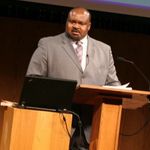 Casely Essamuah is the Global Missions and Compassionate Outreach Pastor at the Bay Area Community Church in Annapolis, Maryland. Originally from Ghana, he is an ordained minister of the Methodist Church Ghana.
Casely Essamuah is the Global Missions and Compassionate Outreach Pastor at the Bay Area Community Church in Annapolis, Maryland. Originally from Ghana, he is an ordained minister of the Methodist Church Ghana.
He received his Th.D. from the School of Theology at Boston University in 2003. His dissertation, “Genuinely Ghanaian: A History of the Methodist Church Ghana, 1961-2000,” examined the history of the Methodist Church in Ghana from 1961, the time of its autonomy from the British Methodist Conference, to the year of 2000, focusing on the missiological issues of contextualization. In this work, he argued that contextualization was one of the most important elements in understanding the history of the Methodist Church Ghana since Ghanaians, especially Fante people, have accepted Methodism on their own terms and have reshaped it to fit their needs. His dissertation was published in 2010 with the same title.
His current research interests include contextualization, over-contextualization, African Christianity, and reverse missions of the majority (or, non-western) world to the western world. In March 2011, he received the distinction of speaking at the Henry Center’s Scripture and Ministry Series, presenting “Missionaries and Over-Contextualization.” In this lecture, he gained wide attention by arguing that the Western churches, especially those in the U.S. are suffering from an “over-contextualizing of cultural forms.” In other words, what matters in the western world, is not the lack of contextualization but over-contextualization. With this concern, he raised a question, “How do you make the gospel understood where it is such a familiar presence as to be unremarkable?”
Essamuah’s interest is not limited to a scholarly one: as an active minister, he is also interested and actively engaged in planting immigrant churches in the U.S.
Bay Area Community Church: http://www.bayareacc.org/
by Hye Jin Lee
Rev. Lisa Beth White on Short-Term Mission Trips
In advance of Rev. Lisa Beth White's visit to BUSTH on March 21 to give a seminar "How to Lead a Mission Trip," she sent the following to help people considering participating to figure out where she's coming from:
According to Robert Wuthnow, approximately 1.5 million American adults
leave the US each year on short term mission trips. Short term
mission trips have grown in popularity since the 1970s when a few
volunteers began traveling to participate in mission projects.
In 1997, I was an adult volunteer with U.M. ARMY (United Methodist
Action Reach Mission by Youth). Youth groups gather to build
wheelchair ramps, do yard work and light home repairs - and I was
hooked. I've worked with adult international trips, domestic youth
trips, and even local mission projects for upper elementary age
students. I stay involved in short term mission because people want
to make a difference, to put their faith to work, and I feel it is
important to help by guiding theological reflection on the practice of
short term mission.
My approach to teaching people how to lead short term mission is to
provide a framework for people to use in planning their own trip, and
to provoke thinking beyond the logistic issues of trips. Small group
discussion of case studies allows participants to begin thinking
theologically about short term mission.
The only other thing I'd add is that when I got involved in STM, I
only saw it from the church viewpoint - that STM was beneficial to
both the recipients and as a tool for spiritual growth for the
travelers. But when I started reading the literature on STM, it
became clear that there are many critical issues to think carefully
about - dependency, objectifying the poor, power and privilege,
mutuality in mission, etc. I hope that my work will bridge the STM
movement in the local church and the critical reflection of the
academy in such a way that the practice of short term mission can be a
more thoughtful process to the benefit of the global church.
Daewon Moon Delivers “Spring” Doctoral Lecture
 Daewon Moon, a second-year doctoral student at the School of Theology, gave an inspiring and thought-provoking presentation on the East African Revival, titled “The Remarkable Partnership in the East African Revival” at the Spring Semester Doctoral Lecture and Lunch CGCM sponsored on Wednesday. The "partnership" referred to is that between a British medical missionary, Joe Church, and indigenous African leaders, mostly from Buganda. It had a profound effect in East Africa and spread internationally.
Daewon Moon, a second-year doctoral student at the School of Theology, gave an inspiring and thought-provoking presentation on the East African Revival, titled “The Remarkable Partnership in the East African Revival” at the Spring Semester Doctoral Lecture and Lunch CGCM sponsored on Wednesday. The "partnership" referred to is that between a British medical missionary, Joe Church, and indigenous African leaders, mostly from Buganda. It had a profound effect in East Africa and spread internationally.
After briefly introducing the origin and development of this 1930s-era Revival, he suggested four distinguishing characteristics of the revival: First of all, small group fellowship meetings, not large-size rallies, were crucial means of spreading the movement. Second, the Revival was Christocentric, with emphasis on the authentic experience of the saving power of Jesus and confessing sins, not on the experience of the second blessing, which is normally called the baptism of the Holy Spirit, although it was influenced by the Keswick movement. Third, the church was unified throughout the Revival, not begetting new independent sects. Finally, the Revival provided the participants a new identity as a new clan in Christ.
His clear and sparkling presentation was evidently very stimulating to the audience and was followed by numerous questions/follow-up questions that produced a lively discussion among the students present.
Stiles’ Lecture Up on BUniverse!
The lecture 60's-era motive editor B.J. Stiles gave at the School of Theology fall semester, "motive Magazine: Methodism's Icon and Albatross," is now available for viewing at BUniverse!
Dr. Amos Yong Lectures at STH
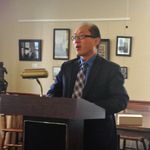
Dr. Amos Yong, one of the most prolific Pentecostal scholars, and B.U. alumnus, gave two energetic and thought-provoking lectures on Pentecostal theology. He received a Ph.D. from Boston University in religion and theology under the direction of Professor Robert Neville in 1999.
In the first lecture, titled, “Global Renewal & Christian Theology for the 3rd Millennium: Opportunities-Challenges,” Dr. Yong presented Pentecostalism as a renewal theology. After briefly introducing the overview of the global renewal movement, he pointed out that the global church has seen two overlapping phenomena: the gradual “Pentecostalization” and “Chrismatization” of the global church, and the “Evangelization” of the Pentecostal churches. Then, he presented the possibility of a renewal theology, distinct from classical Pentecostal theologies such as “evangelical-theology-plus.” He ended his first lecture by introducing his upcoming book, the Renewal of Christian Theology: System and Dogmatic Reconsiderations for a Global Christianity.
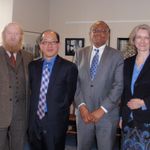
In the second lecture, titled “Renewing Christian Historiography: Toward a P(new)matological History of Christian Thought,” he explored the possibility of new Christian historiography, which can challenge and complement traditional historiographic paradigms. Key features of the renewing historiography include “enthusiastic/charismatic” history of Christian thought, interfacing with the history of Christian spirituality, and hearing the unheard voices of women and the poor.
Both of the lectures were followed by numerous questions and produced lively discussions among the scholars and students present.
By Hye Jin Lee

